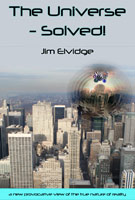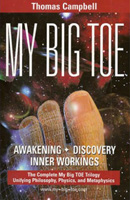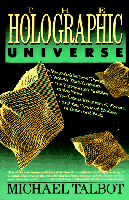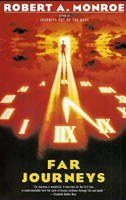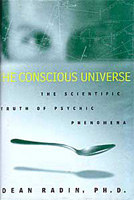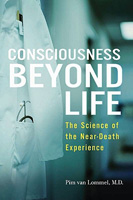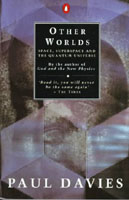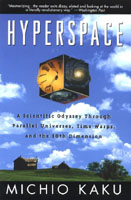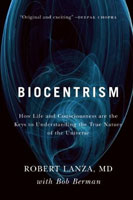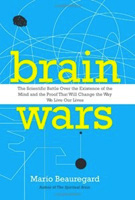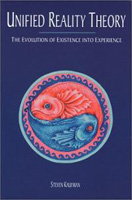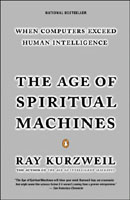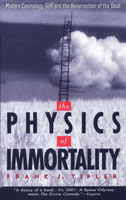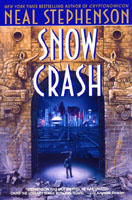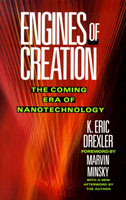 |
 |
 |
 |
 |
|
|
|
|
|
|
|
|
|
|
THE UNIVERSE - SOLVED!
by Jim Elvidge
What if reality isn't really what you think it is?
What if our world was just a big video game? It's actually not as far-fetched as it seems. Within 30 years, we will be able to create virtual environments indistinguishable from our reality. And we are marching toward an inevitable merge with machines. What's more, it is actually impossible to tell whether or not we have already reached that point. The book presents a theory of reality that explains all known scientific and cultural anomalies. Why is the universe so perfectly designed to support life and matter? Why does life feel like it is accelerating? Why do people see UFOs? Is there life after death?
|
|
MY BIG TOE
by Thomas Campbell
If you are going to pick one book that best explains our reality, this is the one. And it isn't just conjecture either. Tom Campbell was the physicist behind the highly controlled scientific experiments done at the Monroe Institute. Partly based on corroborated personal experience and partly based on scientific theory, Tom's ideas explain the origins of our reality, it's evolution, and provides a framework for the mysterious realms beyond. Where my book provides the evidence, MBT provides the answers.
|
|
THE HOLOGRAPHIC UNIVERSE
by Michael Talbot
Starting with a combination of an overview of David Bohm's holographic theory of cosmology and Karl Pribram's views on the holographic nature of the brain, Talbot then proceeds to present explanations for how various types of paranormal activity fit within the framework of the theory. I particularly like the implications of the theory that explain "action at a distance" and some of those other "wishful thinking" premises of Quantum Mechanics. A must read for open-minded people who are not satisfied with orthodox explanations of the structure of reality and the universe. And it totally makes sense!
|
|
|
|
|
|
|
|
|
|
|
FAR JOURNEYS
by Robert Monroe
This is the second of Monroe's OBE trilogy and one that you won't forget once you read it. Remembering that much of the experiments done at the Institute were done with scientific rigor and controls, Monroe's experiences were really extraordinary. "Far Journeys" went far beyond the ordinary OBE and into the rich realms of NPMR (non-physical matter reality). If at all an accurate representation of what else is out there, it makes our apparent reality a tiny place indeed.
|
|
THE CONSCIOUS UNIVERSE
by Dean Radin
This is the quintessential paranormal-myth-busting work by scientist and researcher Dean Radin. Through his meta-analysis of thousands of paranormal experiments conducted with typical university-level scientific rigor, coupled with solid command of statistics, there emerges only one conclusion - that many paranormal phenomena (e.g. telepathy, clairvoyance, precognition) represent subtle yet real effects. His data soundly refutes the skeptics most convincing counter-arguments, such as the file drawer effect.
|
|
CONSCIOUSNESS BEYOND LIFE
by Pim van Lommel
Cardiologist Pim van Lommel explores 20 years of rigorous research on Near Death Experiences and comes to an inescapable conclusion that consciousness is separate from the brain. Arguments that it emerges from brain function are solidly defeated on many counts, including instances of individuals with no EEG and no blood in their bodies, having rich lucid experiences corroborated by medical professionals. There is much more thought provoking research that will open your mind if you let it.
|
|
|
|
|
|
|
|
|
|
|
OTHER WORLDS
by Paul Davies
Throw away that Stephen Hawking stuff on your bookshelf and pick up most anything by Paul Davies instead. In my opinion, the most readable and thought-provoking author of science, physics, and cosmology out there. This book is 30 years old, and so might be a bit out of date, but it was one of the most eye-opening books on physics I ever read. He very clearly outlines quantum mechanics and introduces the bizarre "Everett interpretation" that predicts how uncountable universes are created every second due to quantum mechanical decisions, while solving various paradoxes along the way.
|
|
HYPERSPACE
by Michio Kaku
Think we live in 4 dimensions? Guess again, flatlander. More like 10 or 26, says Michio Kaku, giving a very well written description of Hyperspace, or Superstring theory. Concepts like parallel universes, exotic topologies, time travel, and the resolution of the gravitation paradox (Quantum Mechanics vs. General Relativity) are all in here, in a very readable, logically argued style.
|
|
BIOCENTRISM
by Bob Berman & Robert Lanza
Berman and Lanza turn conventional scientific reason upside down and describe a reality that is solely driven by our consciousness. Clarified by discussions of our perceptions, the Biocentric theory makes sense of the concepts of time, the finely tuned Universe, and the observer effect. It fits with Quantum Mechanics, and aligns perfectly with Programmed Reality.
|
|
|
|
|
|
|
|
|
|
|
BRAIN WARS
by Mario Beauregard
This highly readable book presents a high level summary of various categories of evidence that support the idea that mind and brain are separate entities. Although not as comprehensive as Dean Radin's book nor Pim von Lommel's, Bearegard still touches on many fascinating anecdotes, research, and through-provoking concepts such as neuroplasticity, mystical experiences, and an overall shift in consciousness.
|
|
UNIFIED REALITY THEORY
by Steven Kaufman
Kaufman has a similar premise to the nature of reality as Tom Campbell, namely that it is digital and evolutionary in nature. He dives a bit deeper than MBT does, but perhaps not deep enough to fully demonstrate the math necessary to give strong support for the theory. Yet, he also doesn't touch on the complex panoply of realms and experiences that Campbell does. Still, there are some interesting ideas, such as a well-thought-out explanation for why we are not aware of our unifying consciousness nature and why we are instead driven inward toward individuality.
|
|
THE AGE OF SPIRITUAL MACHINES
by Ray Kurzweil
Ray Kurzweil, entrepreneur and futurist, wrote this thought provoking book on what is to come in the next 100 years. In his view, with machine intelligence fully exceeding human capacity by 2020, humanity will blend with machines in ways most of us have not thought about. Ultimately an optimist, he shrugs off the spectre of robotics and nanotech run amok and concentrates instead on some of the cool things that may be possible, like creating a sofa out of thin air, and immortality (of sorts). All of this assumes that a soul doesn't exist and consciousness is only embedded in the brain, which is a little presumptive for my taste.
|
|
|
|
|
|
|
|
|
|
|
THE PHYSICS OF IMMORTALITY
by Frank Tipler
Probably the most "out there" book I've ever read, Tipler attempts to prove the existence of God through physics and mathematics (the last third of the book are equations supporting his theory). According to him, if intelligent life (humans and future human-inspired robots) can populate the universe at a rate exceeding its entropy decay, we will discover, or rather, create the Omega Point, an intelligence that encompasses all quantum mechanical life-paths, aka God. Not sure I'm particularly comforted by this, but it sure is a thought-provoking read. Not for the faint of heart, I do appreciate the occassional book that wanders into the rare ground between textbook and layman's book.
|
|
SNOW CRASH
by Neal Stephenson
The best of the cyberpunk genre, this is a great read for inspiring one to ponder virtual realities, and the spillover effect. from Amazon... "From the opening line of his breakthrough cyberpunk novel Snow Crash, Neal Stephenson plunges the reader into a not-too-distant future. A breakneck-paced 21st-century novel, Snow Crash interweaves everything from Sumerian myth to visions of a postmodern civilization on the brink of collapse. Faster than the speed of television and a whole lot more fun, Snow Crash is the portrayal of a future that is bizarre enough to be plausible."
|
|
ENGINES OF CREATION
by K. Eric Drexler
This is the visionary bible of nanotechnology, complete with the promise of nanotech, the foundational structures of molecular assemblers, as well as some of the more esoteric and imaginative potential aspects of the technology, such as in infamous grey goo, and the spectacular ideas of smart dust or utility fog. A must read in this days of ever-evolving applications of nanotech.
|
| |
|
|
|
|
| |
|
|
|
|
|
|
|
|
|


